Ever since the city announced its plan to close the D.C. General family shelter and transfer its residents to new facilities in seven of the city’s wards, the new shelters’ prospective neighbors have complained about how a homeless shelter might affect their “property values.”
Last year, a New York Times article explored the delays to the city’s effort to close D.C. General, which, the article explained, hosts single mothers and babies alongside rats and raccoons. “Yet in the struggle to close the shelter, those concerns are outweighed by fears over neighborhood property values or classroom slots for homeless children at local public schools,” the Times reported.
Examples abound. A flyer in wealthy Ward 3 complained about “the safety and health issues and the negative impact on home values because of the shelter.” It takes gumption to complain about safety even though the proposed Ward 3 shelter will be right next to a police station.
And of course, some residents of Ward 1 complained in a flyer that the new shelter at 10th and V would cause “congestion, loitering, safety, decreased property values.”
These objections, as well as cost concerns, have helped delay the closing date for the old shelter from 2018 to 2020.
The latest obstacle is that an architect named Suman Sorg apparently wants more money from the city for the plot of land she owns at 10th and V Streets NW. For many years the spot has been empty except for a vacant landmarked church.
According to reporting by the Washington City Paper’s Andrew Giambrone, D.C. officials said at a community meeting that Sorg wants $11 million for the property. “Suman is always looking for the next best, higher deal,” one of her former employees told Giambrone.
I asked spokespeople for Sorg if this really is a simple matter of holding out for more money. No response.
Studies have suggested that shelters generally don’t hurt property values, according to a Washington Post review of the literature. But even if they did, why would a theoretical decline in the value of a homeowner’s property be more important than giving a family with children a safe clean home?
District homeowners already benefit from absurdly rising home values. I live in a house that abuts an alley near H Street Northeast. Every few weeks, somebody pees on my house. One time somebody even pooped on my house. There have been murders nearby. And yet, people keep buying houses in my neighborhood at higher and higher prices. The value of my own house has increased substantially, pee stains and all.
Those concerned about the impact of a shelter seem to think its residents would walk around committing petty crimes and that new potential homebuyers would be unwilling to pay high prices for nearby homes. This line of thinking may reflect an unwillingness to differentiate between family homelessness, often caused by the vagaries of the free market, and the more visible, but far less common, kind of chronic homelessness that is often caused by mental illness. Acknowledging that high housing costs drive families into shelters would also force people to acknowledge that property values are actually part of the problem.
Property values are typically assessed by looking at how much people paid for comparable properties nearby—not by assessing the range of current residents. The ultimate irony is that if the city meets Suman Sorg’s million dollar demands for the unused lot at 10th and V Streets NW, nearby property values will go up.
Gross!








